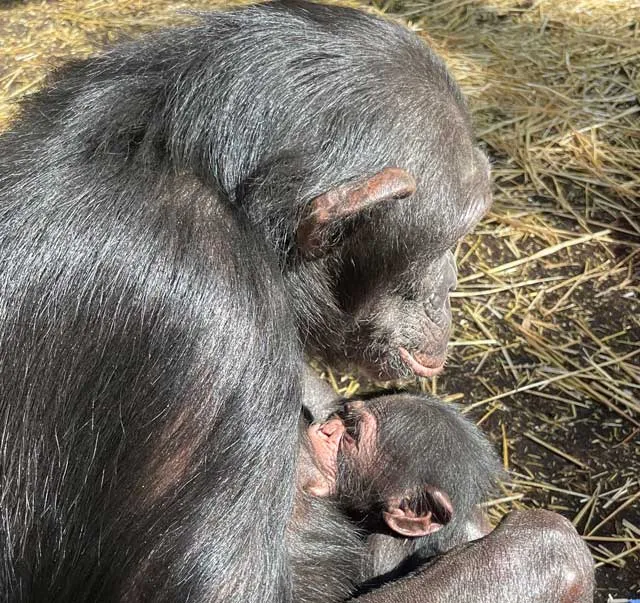
Chimp Gigi with her hours-old infant boy.
Chimpanzee Makes His Debut at the North Carolina Zoo
Asheboro, N.C. — May 30, 2023 - The North Carolina Zoo announces a new addition to the chimpanzee troop! On Sunday, May 21, a healthy baby boy was born to chimp Gigi dramatically – on habitat in full view of guests.
"In true Gigi fashion, she gave the guests quite the show on Sunday afternoon," said Animal Management Supervisor Jodi Wiley, who has worked with the chimp troop for several years.
The animal care and veterinarian teams report mother and baby are doing well, and the baby appears healthy, active and nursing.
Gigi, who is 12 years old, is a first-time mother and was born at the Dallas Zoo in 2011. She arrived at the Zoo in 2012 with three other family members – mom Gari, sister Gerre and niece Genie.
Chimps are very protective of their young, and mothers hold the infants exclusively to their chest until about four months of age; only then are they allowed on the ground to begin exploring.
The most recent chimp births were male Obi and female Asha in 2019, who are now rambunctious toddlers.
"Gigi as a mom, has been doing great so far. She's been holding the baby very close, and the baby has had a firm grip. The rest of her troop has been interested, especially our three-year-old Asha. Gigi has had some great mom role models, including her mom Gari, so we're excited to see Gigi raise her own," said Zookeeper Kristy Russell.
This is the sixth chimp birth at the North Carolina Zoo since 2010, making the Zoo currently the most successful Association of Zoos and Aquariums (AZA) zoo for breeding chimps. The Chimpanzee Species Survival Plan (SSP), managed by the AZA, recommended this planned birth.
The gestation period for chimpanzees is 230 days. Chimps have an average life span of 35-40 years in zoos.
Chimps are one of the five types of great apes, along with gorillas, orangutans, bonobos and humans. They are well-known for their intelligence and tool use. Chimps communicate in a variety of ways, including vocalizations, gestures and body posture, and facial expressions, allowing them to maintain complex relationships within communities that can number over 100 individuals in the wild.
Chimps are listed as Endangered in the wild because of poaching and habitat destruction in the forests of equatorial Africa, and populations have steadily declined over the years. Although numbers are difficult to estimate, the International Union for Conservation of Nature (IUCN) believes there are 172,000 – 299,000 left in the wild.
With the new baby, the Zoo's troop now consists of 16 chimpanzees –females Gigi, Amy, Ebi, Gari, Genie, Gerre, Ruby, Tammy and Asha; males – Jonathan, Lance, Sokoto, Kendall, Gus and Obi and the new infant.
###
About the North Carolina Zoo
At the North Carolina Zoo, we celebrate nature. As the world’s largest natural habitat Zoo, we inspire a lifelong curiosity about animals for the hundreds of thousands of people who visit our Zoo each year. Our dedicated team of experts provides exceptional, compassionate care for the more than 1,700 animals and 52,000 plants that call our Park home. We also lead efforts locally and globally to protect wildlife and wild places because we believe nature’s diversity is critical for our collective future. The North Carolina Zoo invites all of our guests to witness the majesty of the wild in the heart of North Carolina and welcomes everyone to join in our mission to protect nature’s diversity. Visit NCZoo.org to begin your life-changing journey.
About the North Carolina Department of Natural and Cultural Resources
The N.C. Department of Natural and Cultural Resources (DNCR) manages, promotes, and enhances the things that people love about North Carolina – its diverse arts and culture, rich history, and spectacular natural areas. Through its programs, the department enhances education, stimulates economic development, improves public health, expands accessibility, and strengthens community resiliency.
The department manages over 100 locations across the state, including 27 historic sites, seven history museums, two art museums, five science museums, four aquariums, 35 state parks, four recreation areas, dozens of state trails and natural areas, the N.C. Zoo, the N.C Symphony, the State Library, the State Archives, the N.C. Arts Council, the African American Heritage Commission, the American Indian Heritage Commission, the State Historic Preservation Office, the Office of State Archaeology, the Highway Historical Markers program, the N.C. Land and Water Fund, and the Natural Heritage Program. For more information, please visit www.ncdcr.gov.

